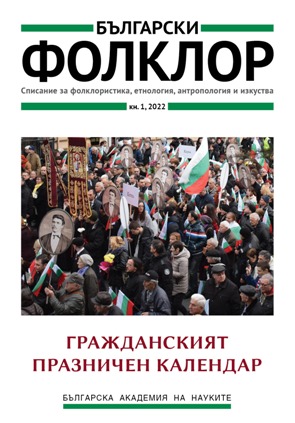Градска празничност в епидемична обстановка
Town Festivity in an Epidemic Situation
Author(s): Iskren VelikovSubject(s): Politics / Political Sciences, Politics, History, Anthropology, Social Sciences, Cultural history, Psychology, Customs / Folklore, Media studies, Governance, Communication studies, Sociology, History of ideas, Local History / Microhistory, Social history, Recent History (1900 till today), Cultural Anthropology / Ethnology, Culture and social structure , Theory of Communication, Social psychology and group interaction, Social development, Management and complex organizations, Crowd Psychology: Mass phenomena and political interactions, Health and medicine and law, Rural and urban sociology, Sociobiology, Sociology of Culture, Present Times (2010 - today), Social Norms / Social Control, Politics of History/Memory, Politics and Identity, Identity of Collectives
Published by: Институт за етнология и фолклористика с Етнографски музей при БАН
Keywords: festivity; holiday; transformation; COVID-19; limitations
Summary/Abstract: The holiday is an essential element in the ideological regulation of public life; it plays an important role in shaping and stabilizing the group celebrating it, in all cases by actualizing the most important unifying values, and very often – by distinguishing examples of exemplary behaviour. The spread of the COVID-19 epidemic at the very beginning of 2020 leads to a number of radical changes in social life. The speed with which processes develop, as well as the search for new forms to continue established practices, leads to experimentation with the possibilities of new technologies, as well as of new conditions – education in an online environment, online shopping, outsourced commercial cash registers for outdoor service, limiting the capacity for public access, reducing programs, etc. Limiting physical access to official celebrations provoked an attempt to compensate for it by broadcasting the festive ceremonies live. However, the transfer of an event to an online environment places local communities in the passive role of spectators of a performance, without the opportunity of participation, and the social function of the celebration is reduced to the possibilities of the social network to communicate through texts and chat with other representatives of the community who observe the broadcast. These restrictions seem to compromise the very idea of a celebration and make visible the fact that its fundamental feature is the possibility of physical presence and participation of citizens.
Journal: Български фолклор
- Issue Year: XLVIII/2022
- Issue No: 1
- Page Range: 076-091
- Page Count: 16
- Language: Bulgarian
- Content File-PDF

